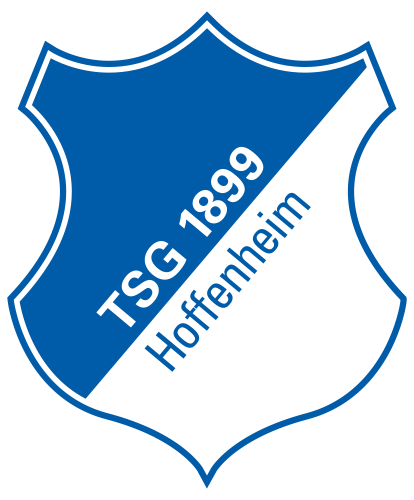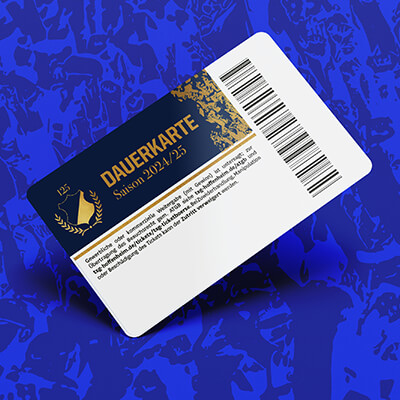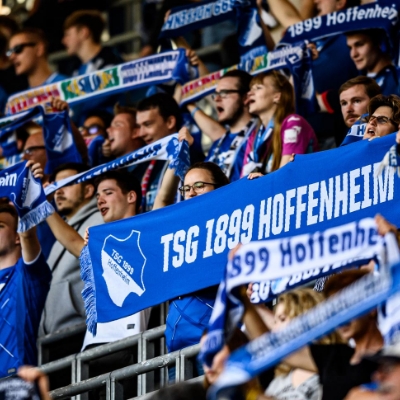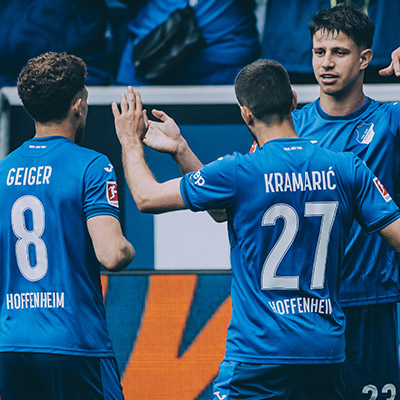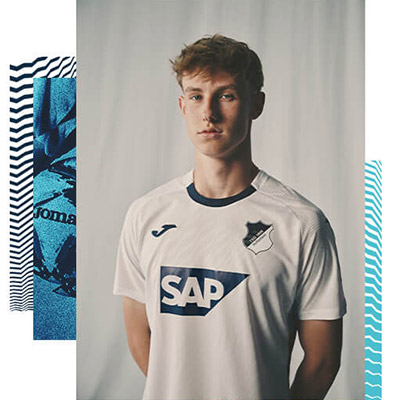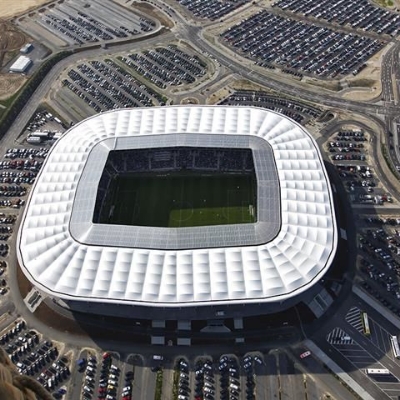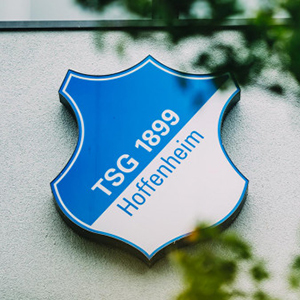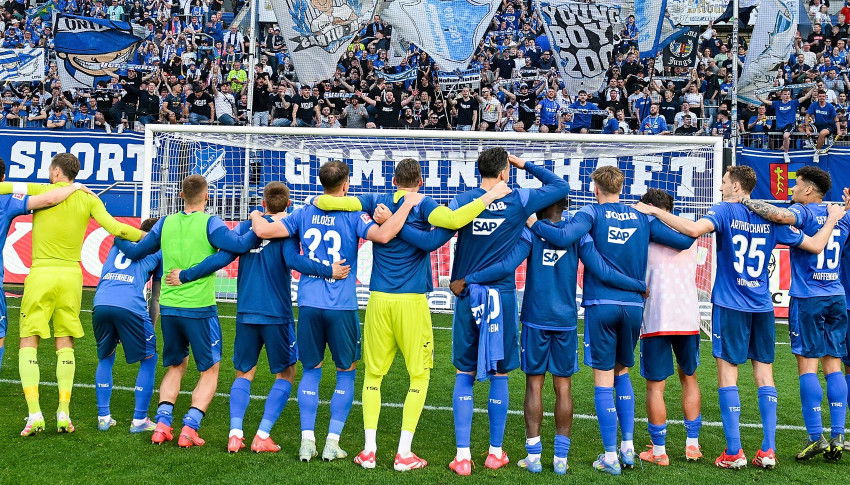Hoeness: "We're hungry for success"
Mr. Hoeness, your first trip as TSG coach in the summer of 2020 saw you travel to the training camp in Rottach-Egern. The very place where the team went in July 2021 to prepare for this season. How different was 2021 at the Tegernsee compared with the summer of 2020?
"It starts with the practical things. When we went to the training camp a year ago, I didn't know anyone except my assistant coach. And a change of job and location always requires a period of adjustment. Then you start working on the first day and get to know each other in the process, which is a huge difference compared to this season. There's restructuring and optimisation every season, a few new faces, but you don't have to go through this phase of getting used to each other. It has felt good this time, because the adaptation process took a lot of energy. It was therefore an immense advantage before this season that I could devote my energy to my core responsibilities. We also have a much better starting point in other relevant areas. That's good; I sense it every day, because this year we were able to just pick up where we left off and didn't have to reinvent everything."
Now you have a largely unchanged team and you're heading into your second season together. What will this team stand for?
"We want to play active football; show dominance and dynamism. Dominance means combining a possession-based approach with a dynamic component, i.e., repeatedly getting in behind. The switch phases are extremely important: defending forwards, winning the ball and then going straight for goal. Dominance off the ball means pressing early and winning the ball back – and you need dynamism to do that. That was our goal last season, but now we have much better options to train this in a targeted manner. And then it tends to look the way that it did in the final seven games in the second half of last season."
The question of "How do I avoid falling behind early on?" is likely to be on the agenda too.
"That's an important topic which we're addressing: how do we start the game better? You don't just do it differently; you first have to be aware of it and then sharpen your senses for it. In pre-season, for example, we worked on this in training sessions using extra incentives: we often played three 10-minute games, with goals counting double in the first three minutes. These are things that we're working on intensively. Better that than playing eight different systems."
In order to be able to work optimally in training, you want to assemble a "performance-ready group". What does that mean?
"A functioning group is fundamental when it comes to performance. And if there is zero chance of getting playing time, then the desire to perform decreases. There is a certain energy in every team in which the lads believe: 'If I train well, then I'll play.' Even if there is only one person who knows that he is no longer needed in the group, that impacts the positive vibe. We need to go about preventing that."
So every player needs to become important for the team.
"That's the beautiful thing about team sports and football in particular. Things are consistently changing throughout the course of matches or a season, but also as a result of tactical considerations or – in the current situation – illnesses. And there comes a point in time where players with a secondary role put their hands up and say: 'Hey, I also want to get in the team and I've earned my chance.' That has always been the exciting thing. And here every player is extremely welcome to play their way into contention."
An opportunity for young players in particular.
"Certainly. The kind of story like Marco John's isn't an everyday occurrence and is down to the special circumstances. In another season, he probably wouldn't have had to assume such an important role in the team so quickly and been able to perform that way. And suddenly you have someone who was actually a total rookie but is now an established player. Marco has worked towards that. He got a chance he wasn't expecting, and he seized his place. In David Raum, he will have now a new and strong competitor; that will do the pair of them – and above all TSG – good. Particularly as Marco is a very mentally grounded player who can realistically assess his situation, but also someone who always wants to play and does everything to make it possible."
The aforementioned David Raum became an U21 European champion in the summer and represented Germany at the Olympic Games in Tokyo. What role do you expect him to have – and from when?
"We brought him in because he can help us out and we hope that he does so as quickly as possible. It was important to bring in lads who possess a certain mentality. We're still without Ermin Bičakčić and Benni Hübner, of course. Players who can work hard and lead the way are a big help to us. For all the new signings, it was important that they are capable of learning and performing. We want to be hungry – in order to continue our development and achieve something."
Statistically speaking, you yourself already hold a leading position after 35 matches as a Bundesliga coach: of the 16 Bundesliga clubs who were already in the division in 2020, only four are heading into the new season with the same coach. Christian Streich, Urs Fischer, Pellegrino Matarazzo and yourself. What does that say about the volatility of the business – and perhaps also about the quality of TSG Hoffenheim?
"The pace can hardly get any faster, that's for sure. And the past year has certainly not always cast the coaching sector in the best light either. On the other hand, TSG as a club have demonstrated that the objective is to build something long-term. Last season, the circumstances meant that it could only be about getting through the current situation. We did that. We didn't lose our composure and we can draw energy from that. I'm also convinced that it's important to have continuity within the club if we are to develop things sustainably."
Let's look back: As a Bundesliga novice, you must have had thoughts to yourself prior to your first season about how big the leap would actually be.
"It was clear to me the difference would be big. There are additional responsibilities such as media work and a significantly larger staff, which places you in much more of a leadership role. And, of course, it is enormously different to work with players who have already gained a certain amount of experience at the highest level. These are certainly significant differences compared to working in the third tier. But what remains the same in the end is the game itself: the phases of the game that you have to think about remain the same from the U19s to the Bundesliga."
But you had an especially hard time of it last season due to the circumstances.
"I simply had to react continuously to situations that could not be planned for in advance. It was a season overshadowed by the corona pandemic, one that started later but still finished at the same time – and we had additional challenges in the Europa League and that meant many games within a few weeks. If, on top of that, there are also innumerable injuries and illnesses – as was the case with us – then you suddenly develop into a crisis manager."
With new core responsibilities.
"I had to learn quickly to react to things, while thinking in a solution-oriented-manner, staying positive and looking forward. That was the important thing. And I believe that it was something special too: experiencing all of that in my first season was a total baptism of fire. It doesn't get tougher than that; I was thrown in at the deep end and I had to swim to safety. That's what we did as a club and those are experiences that will help us this season. We know that we can overcome crises but we still hope that our path through the new season is more carefree and that we can focus more on being developers than crisis managers."
Given the many setbacks, does there sometimes come a point when frustration sets in?
"I believe there were at times, throughout the club. Due to the corona issue, there were simply no blueprints at all that we could work from at times. The year was very, very demanding and, yes, a very, very big challenge. But in the end, I can say that we overcame all the obstacles."
In an interview with Heilbronner Stimme, you gave TSG's season the school grade of "B-" or "C+". Looking back on it, what was missing for you to achieve a better grade?
"That's difficult to say. First of all, I'm a humble person, I'd probably never give myself a particularly good grade anyway. And you can't give yourself an A if you finish 11th, even though you can't assess this season by normal standards. You have to take the general conditions into account, that's the art. And that's why I say in the end, after a run-in of seven games without defeat, having earlier been in an ominous position, that we can be proud. What we achieved despite the circumstances is positive. Ten or more players were missing almost all the time. That's no excuse, but of course it has an impact if we can only start a game with the same starting XI once in a row. But even then, you can't just stand there and complain and say, 'Yeah, well, it wasn't our fault.' We don't let ourselves have it that easy."
Some of your players have already publicly announced: 'We want to challenge at the top again, we weren't satisfied with 11th.' How would Sebastian Hoeness the coach phrase it?
"In principle, I can identify with that statement. But for me as a coach, the process is interesting. It's not enough to just come up with a targeted outcome that's 12 months away. That's why I'm always in favour of focusing on the here and now, doing the things you have in hand well – for example, performing well at set-pieces, showing the will to defend the goal to the hilt. That then makes goals more tangible and also helps you develop something. So you increase the likelihood of being successful in the end. But basically we are determined, ambitious and want to achieve the maximum. I, too, have the ambition to challenge at the top – in other words, to cause trouble for the clubs that are financially stronger and to leave one or two of them in our wake. We need this determination and this ambition – and I have it, too."
You were under a whole lot of pressure, so it does takes backbone to keep your cool.
"You need a thick skin, without question, and you're not really prepared for it either. There have been phases that were very intense, and yet I have the ability not to lose myself. Maybe it's also part of my personality to stay calm in such phases. We in the coaching team, with the support of the club of course, can then focus on the essentials."
But even a decidedly calm Sebastian Hoeness has to wobble sometimes, doesn't he?
"Of course I know the first impulse when I read or hear what can be vicious criticism: Boah, madness. You feel it briefly in the pit of your stomach when you read things that are not factually correct. Then you have a sense of injustice and do not know exactly what to do about it. But I've learned: the only thing we can do is try to be successful in sports. And as part of that you have to stay calm."
How do you manage that?
"I have a close-knit family. And of course that helps, just coming home and having a safe haven there to acknowledge: 'All right, ultimately it's just a job; it's a sport, and there are worse things.' But these are inner processes and maybe I have the kind of inner peace or security to say: no matter what, everything will be fine."
A high-profile, public exaction of revenge is seemingly not your thing.
"I don't do things in and for the public because I think it's simply populist and, in my view, it only has a short-lived effect. Of course, our internal situation was anything but peace, joy and happiness after the Mainz game (editor's note: 2-1 defeat on 21 March). Things got a bit rough, but in an authentic way. Then we just got some momentum and the bad luck that we had before then turned into a positive against Leverkusen and in Leipzig."
You're now heading into the new season with this positive experience and on the back of a seven-match unbeaten run in the Bundesliga.
"Now I just want to develop the team, all of us, and then this thing will go in the right direction. I'm deeply convinced of that. You can see it in the guys every day: they're winners and they want to win. And when they suddenly sense they can achieve something, that desire grows and grows. That's what we're working towards now. We're hungry for success."



